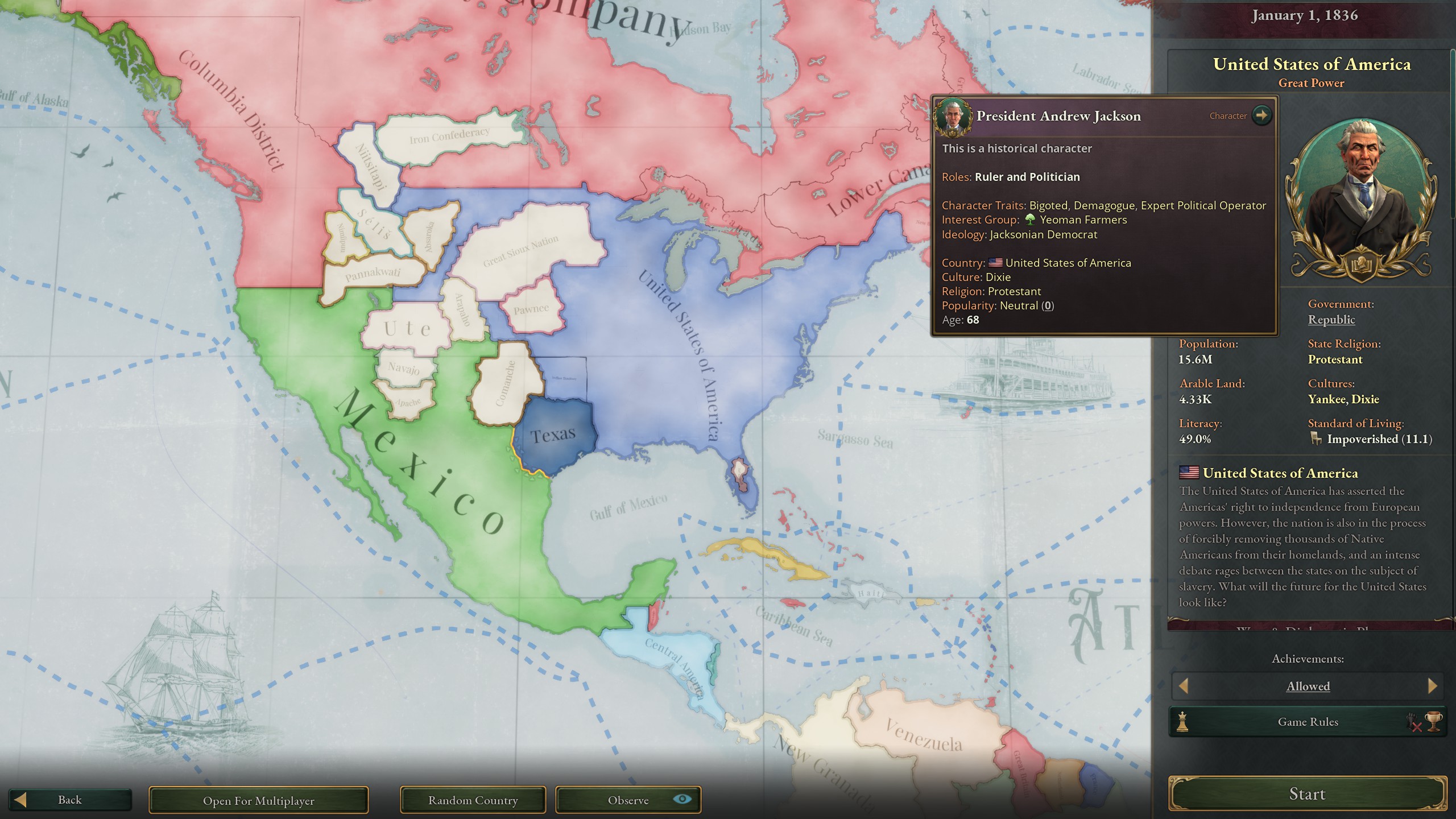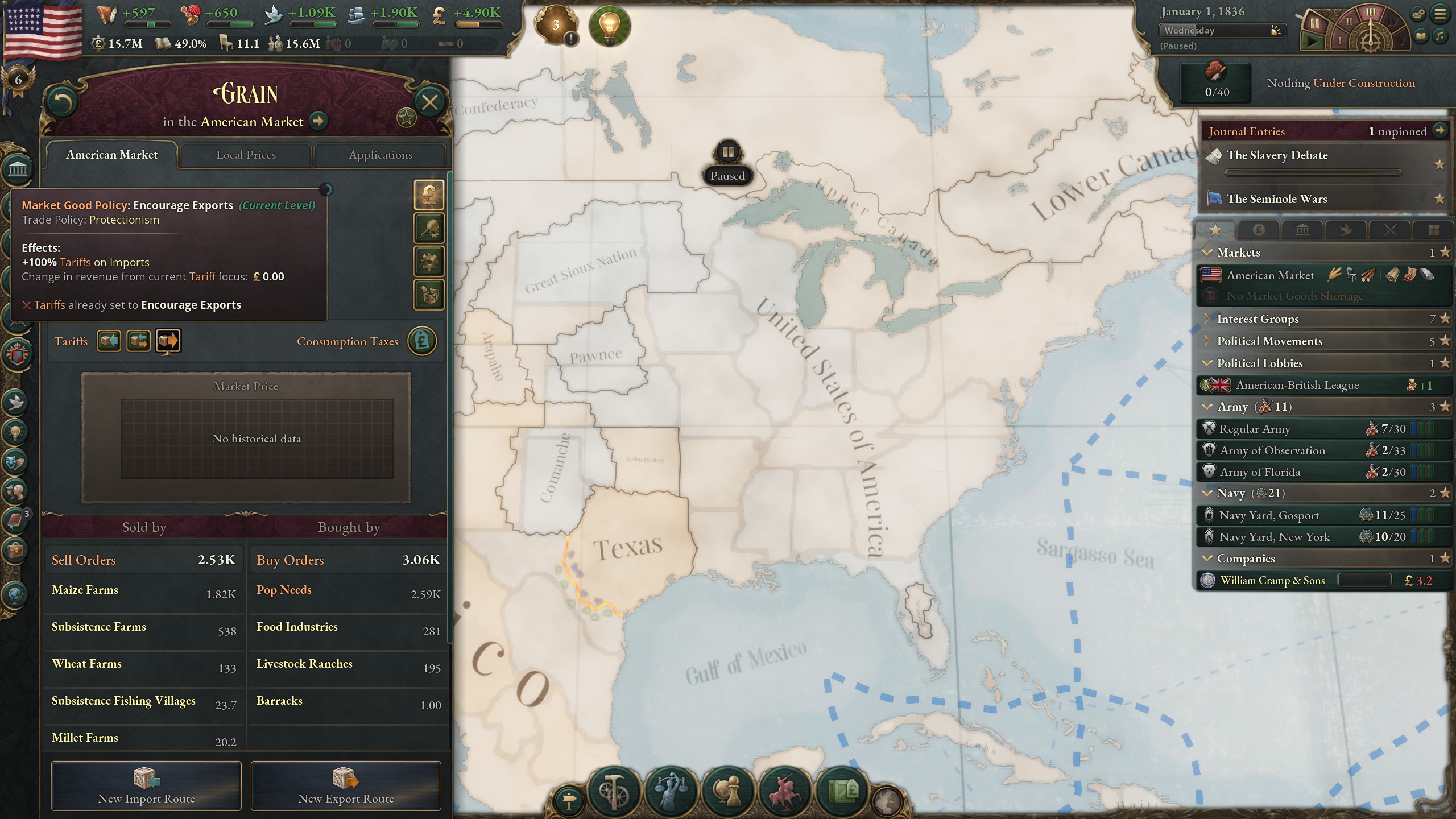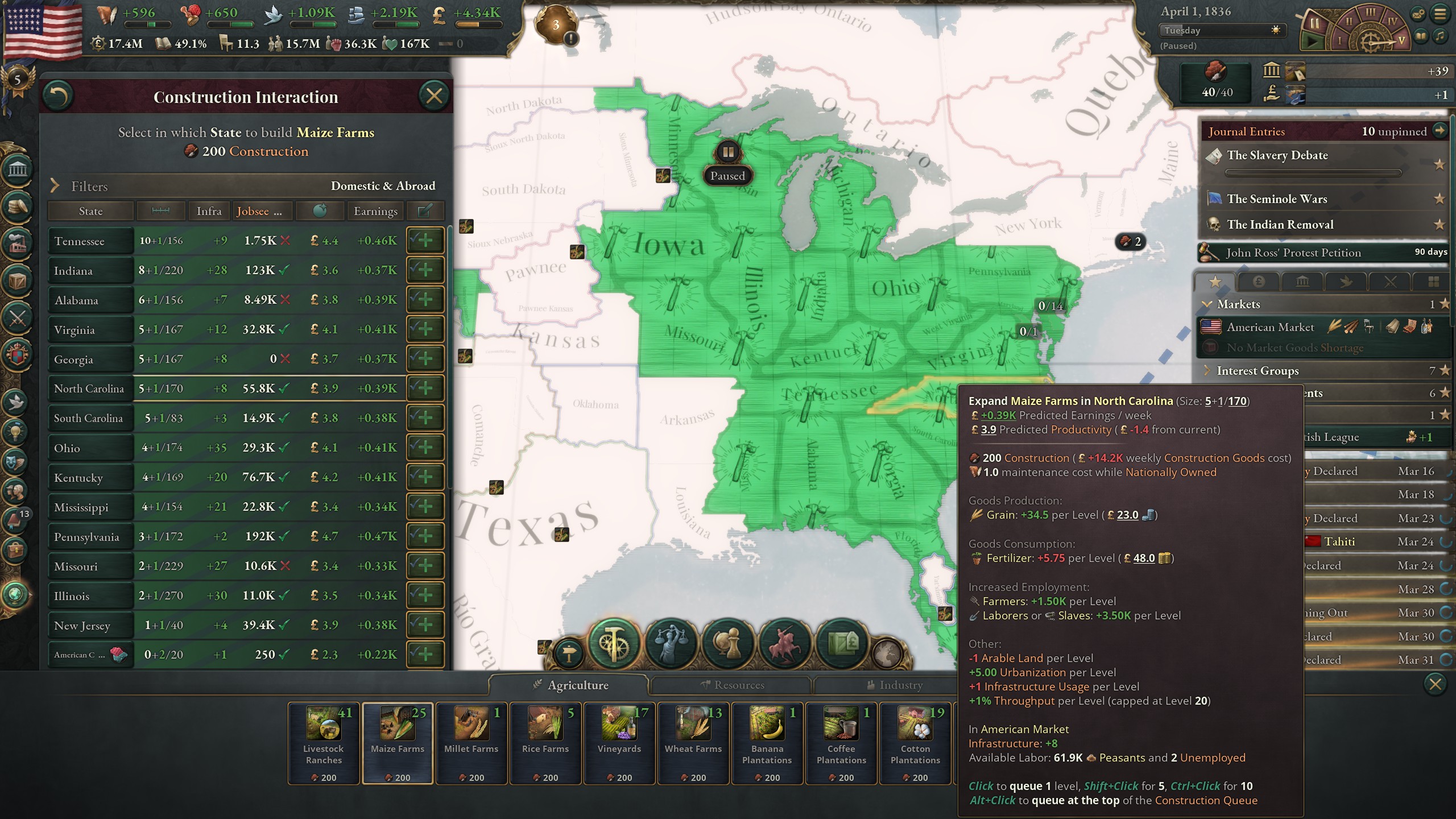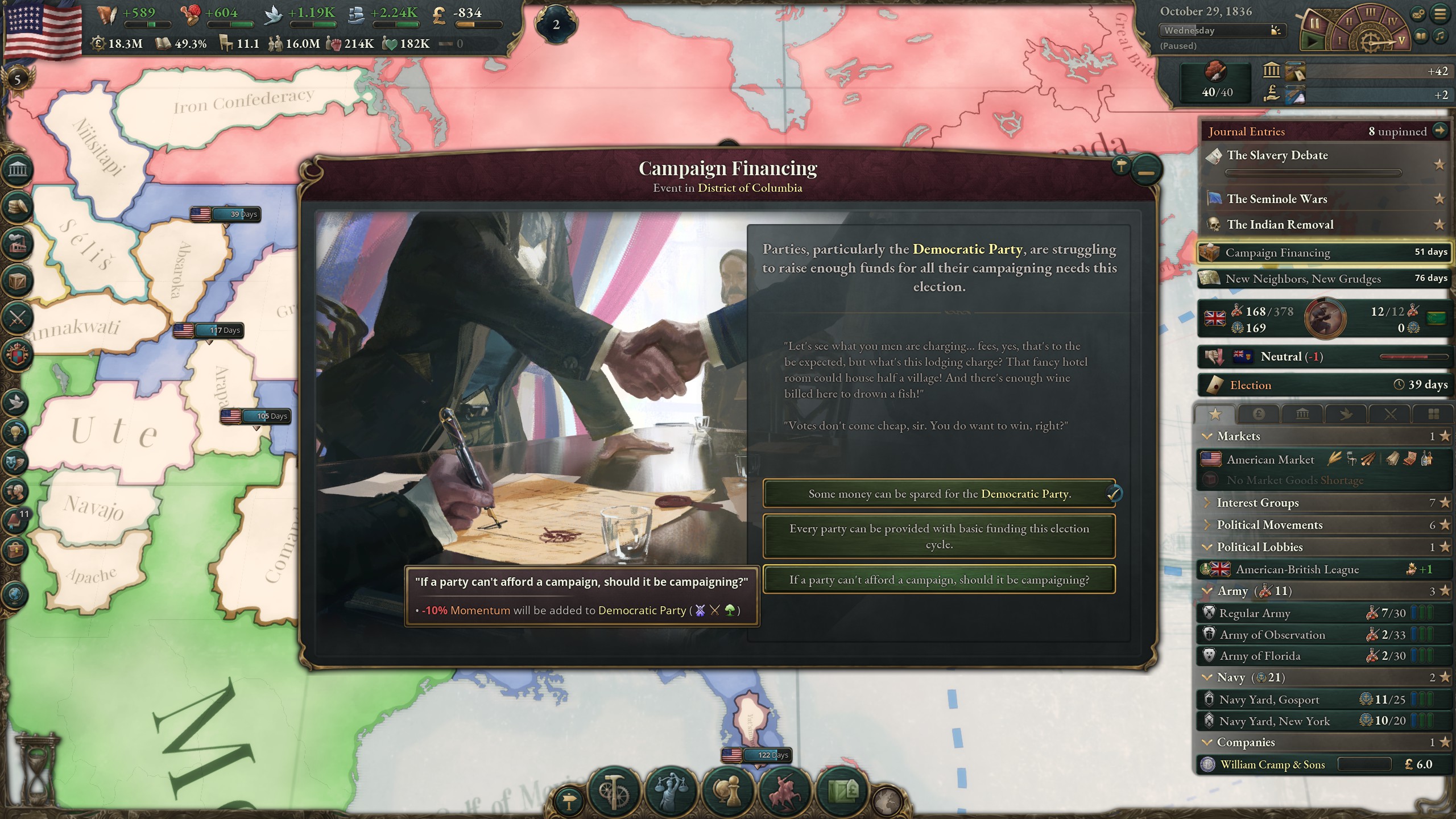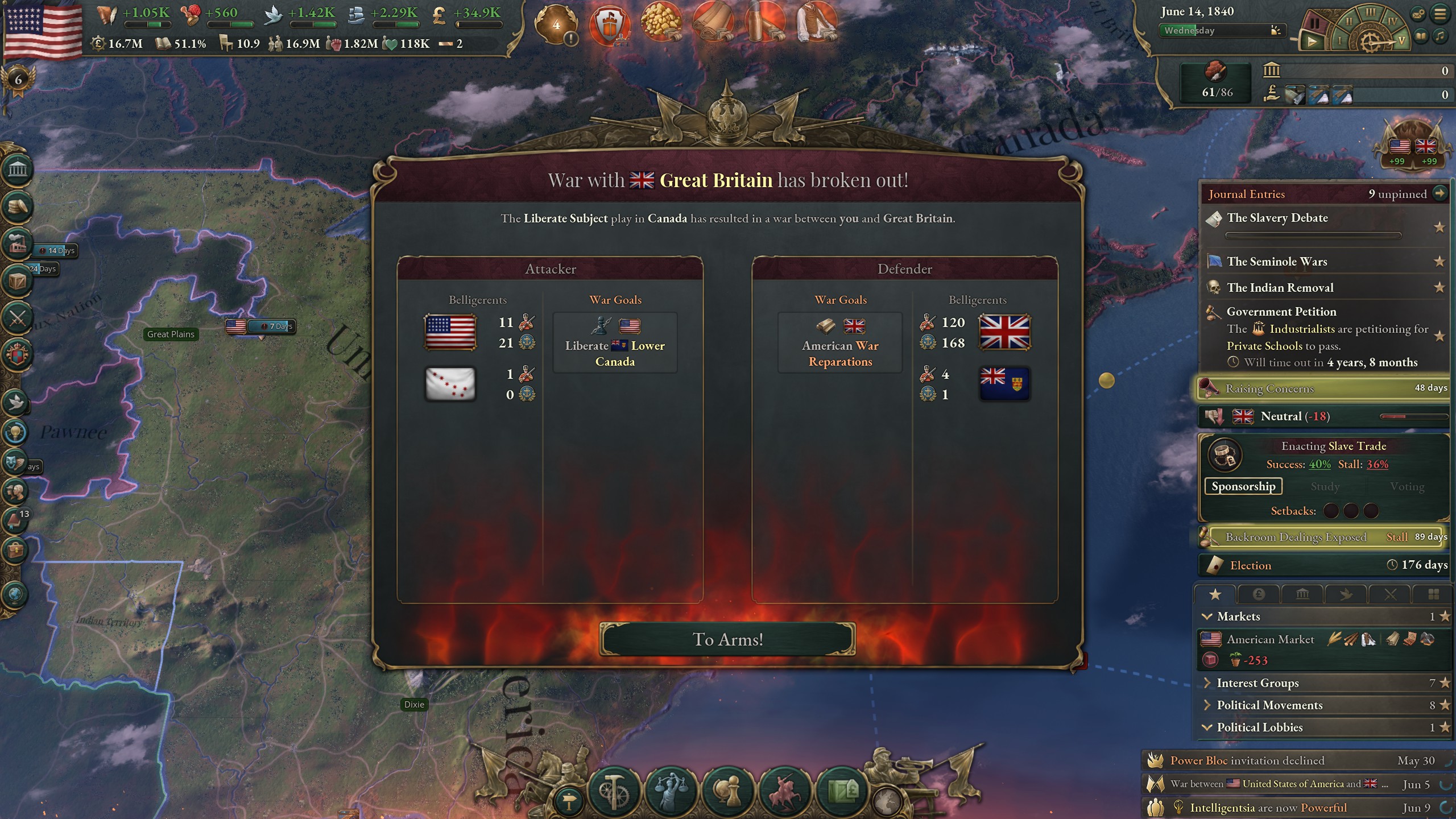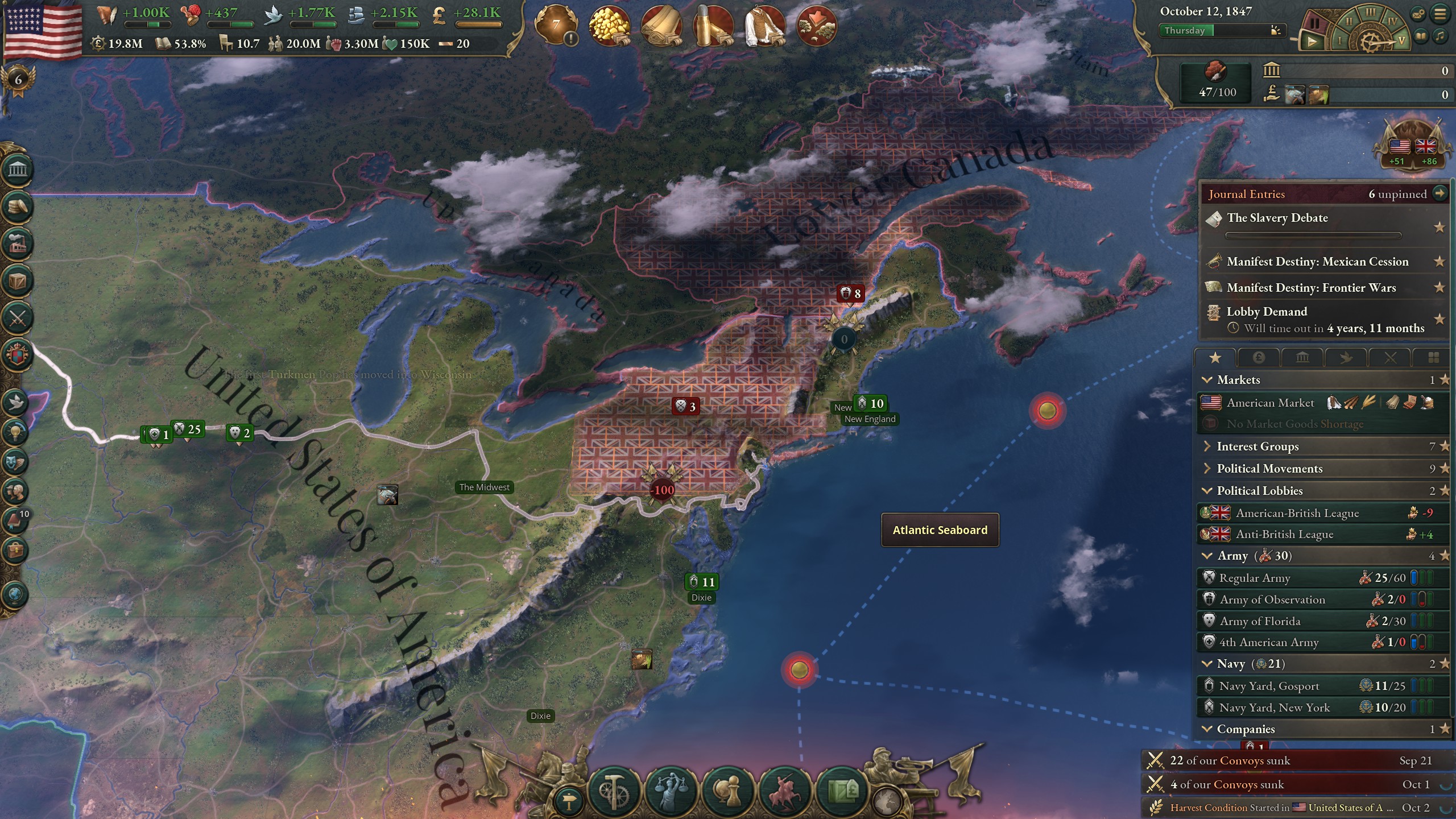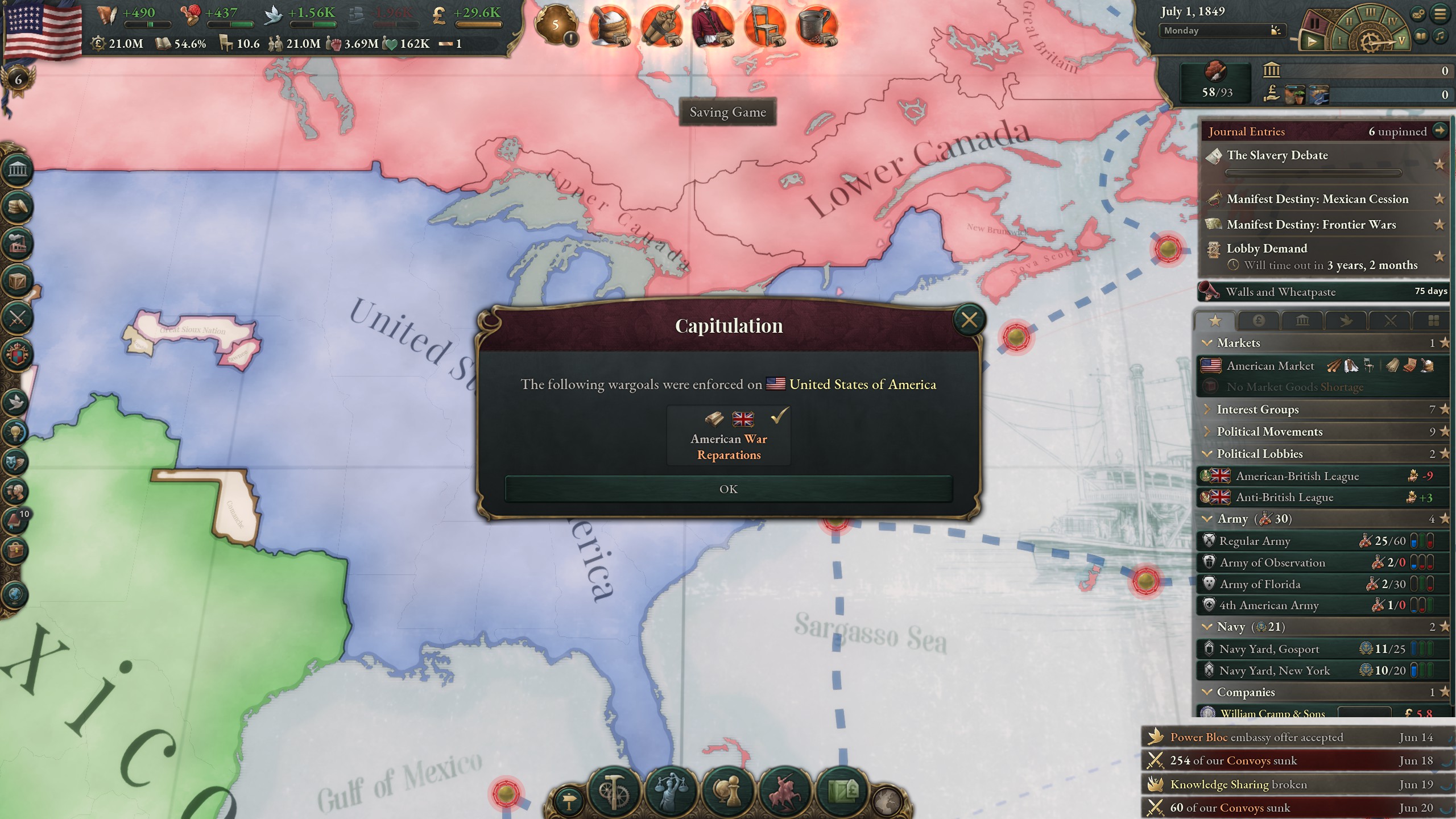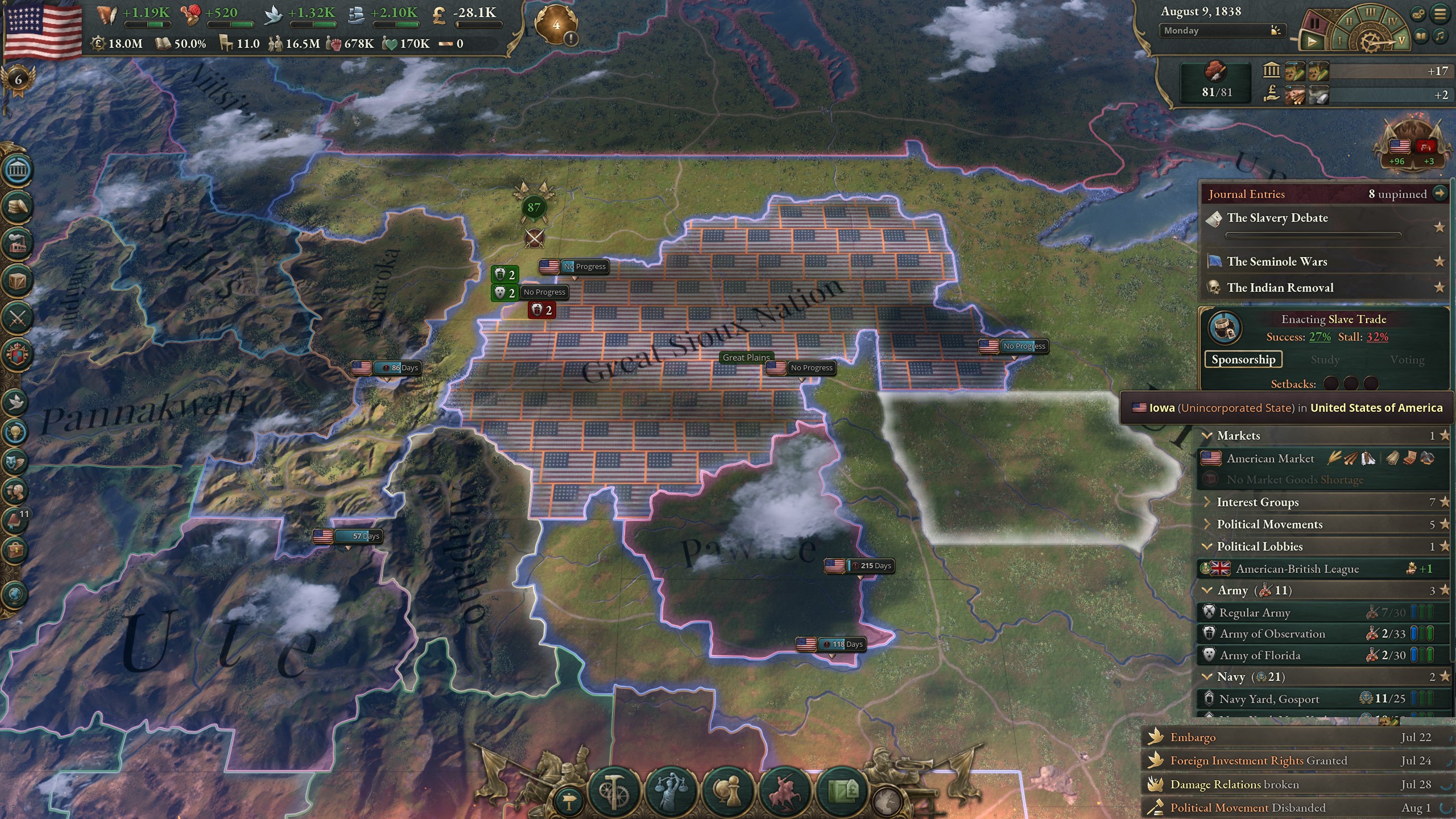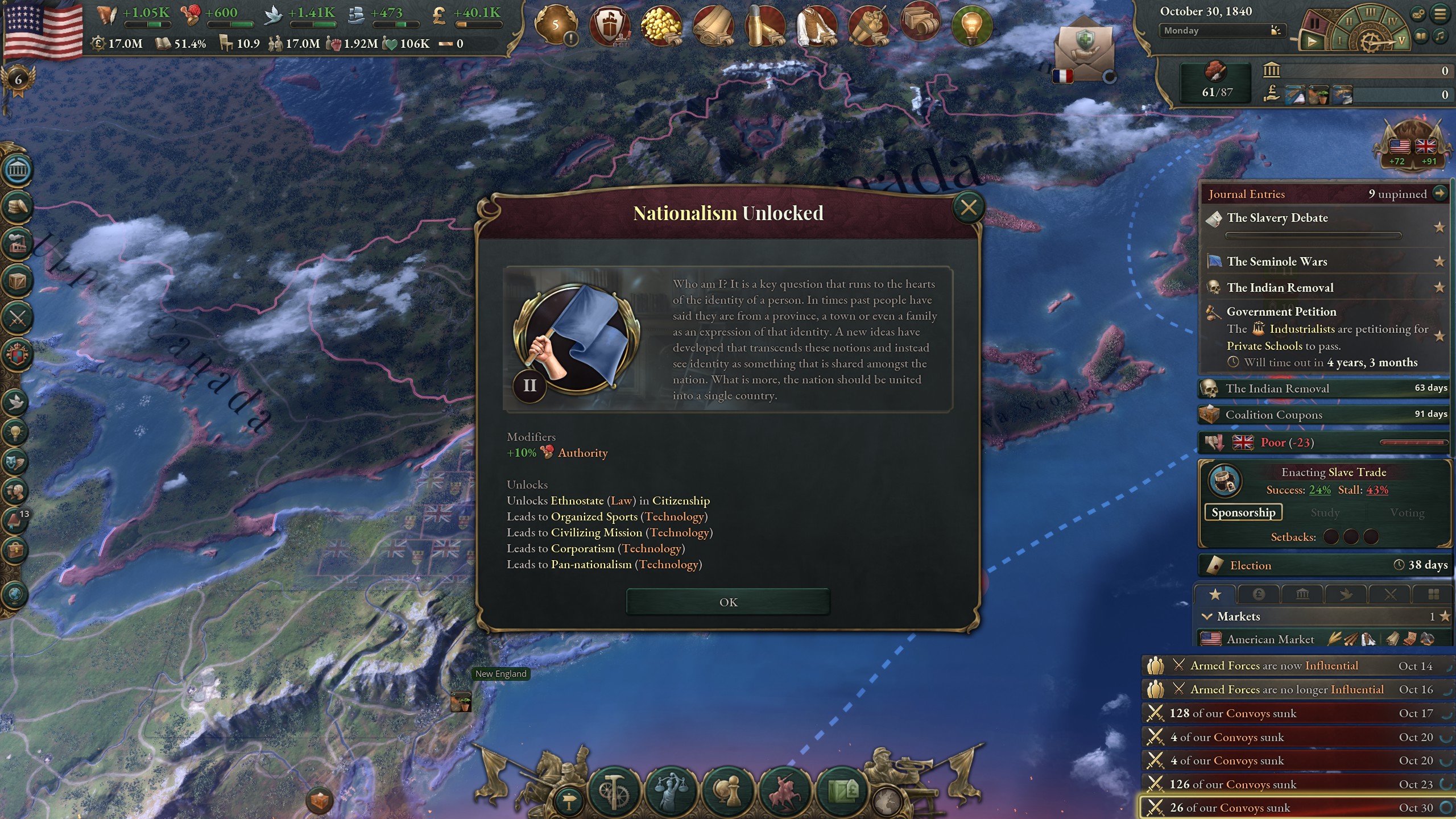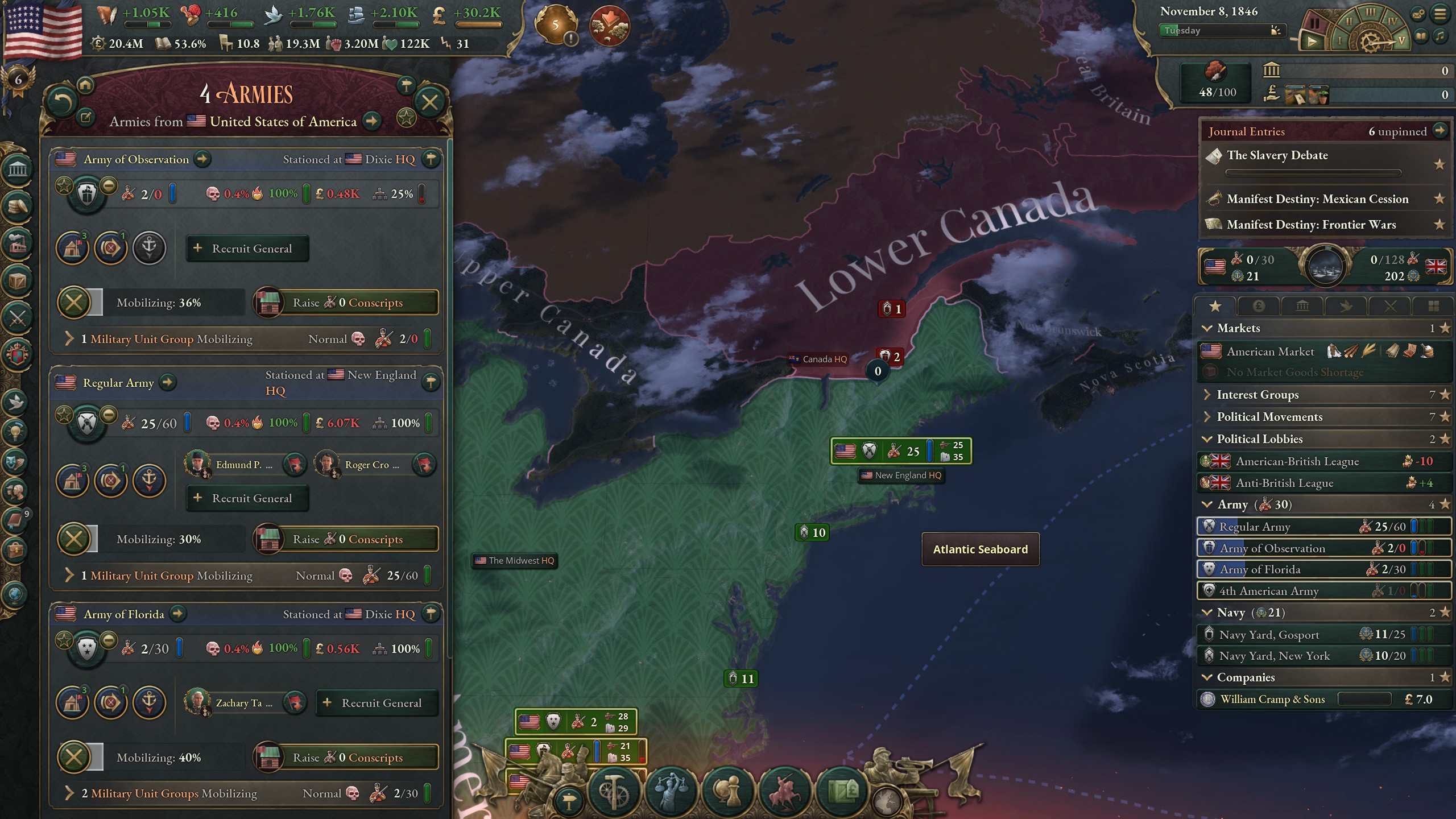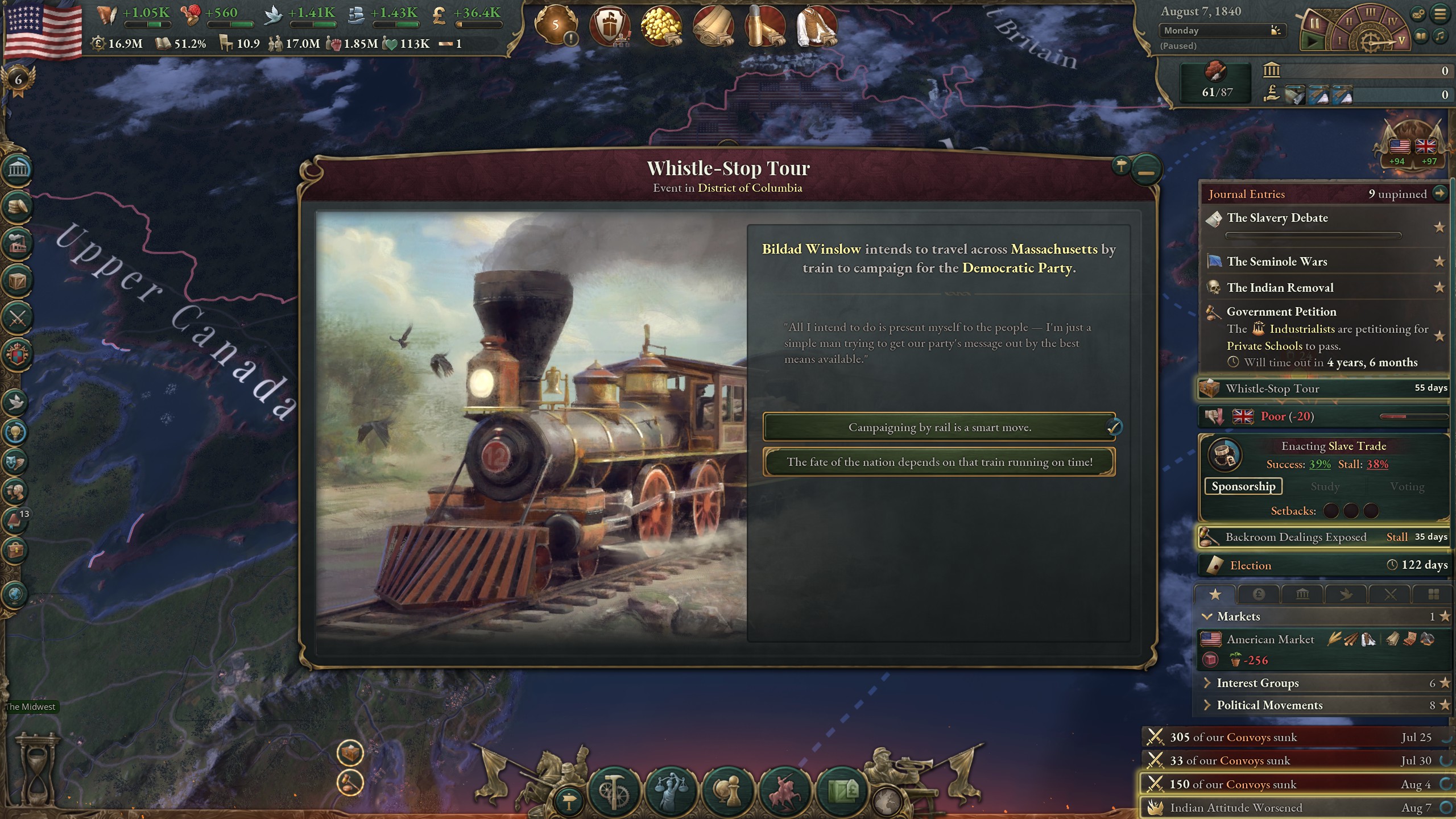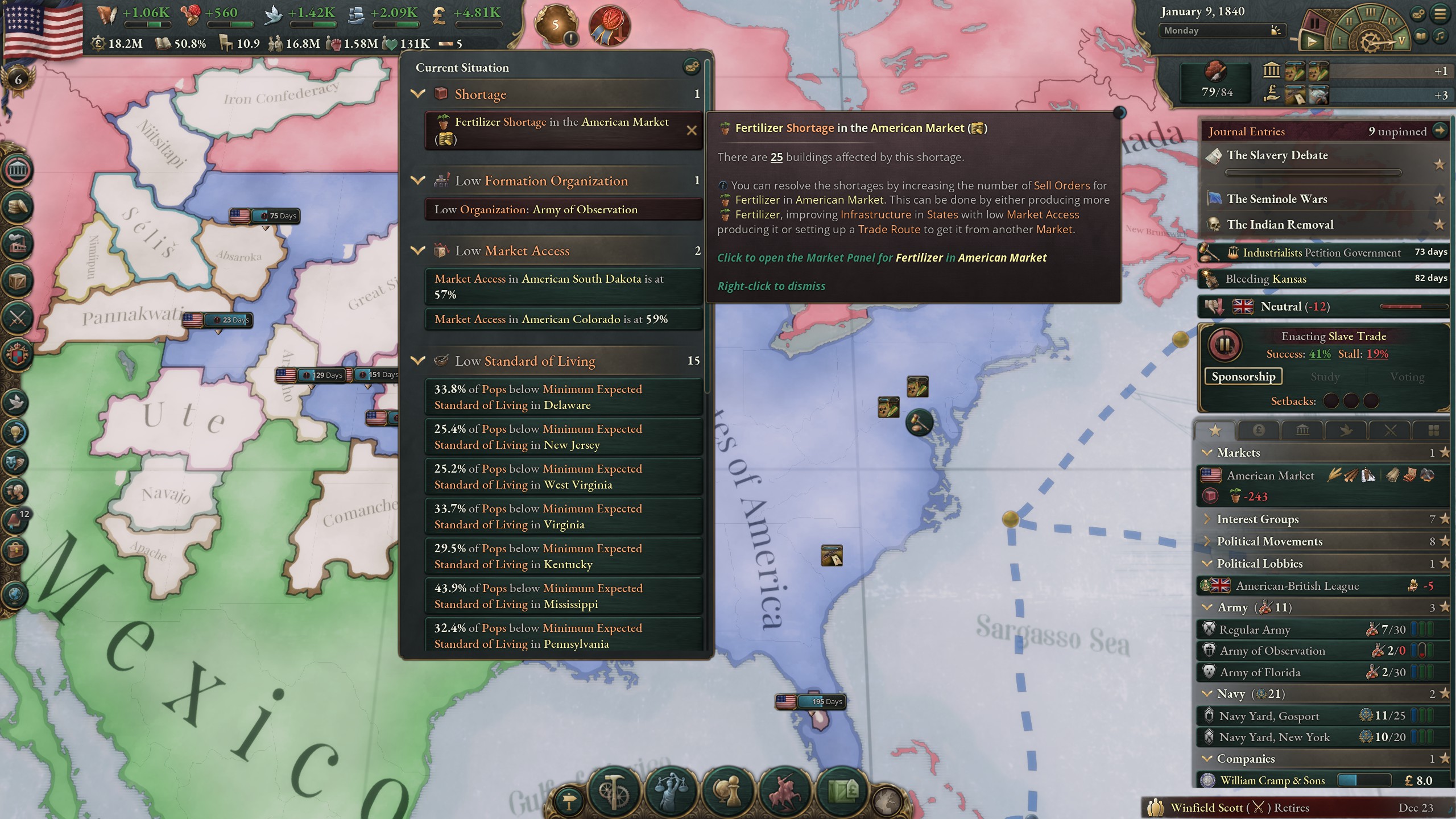I did Liberation Day tariffs in Victoria 3, and it all went well until the famine in Colorado, the 2 lost wars with Canada, and the president beating a man to death with a stick
But apart from that, would recommend.
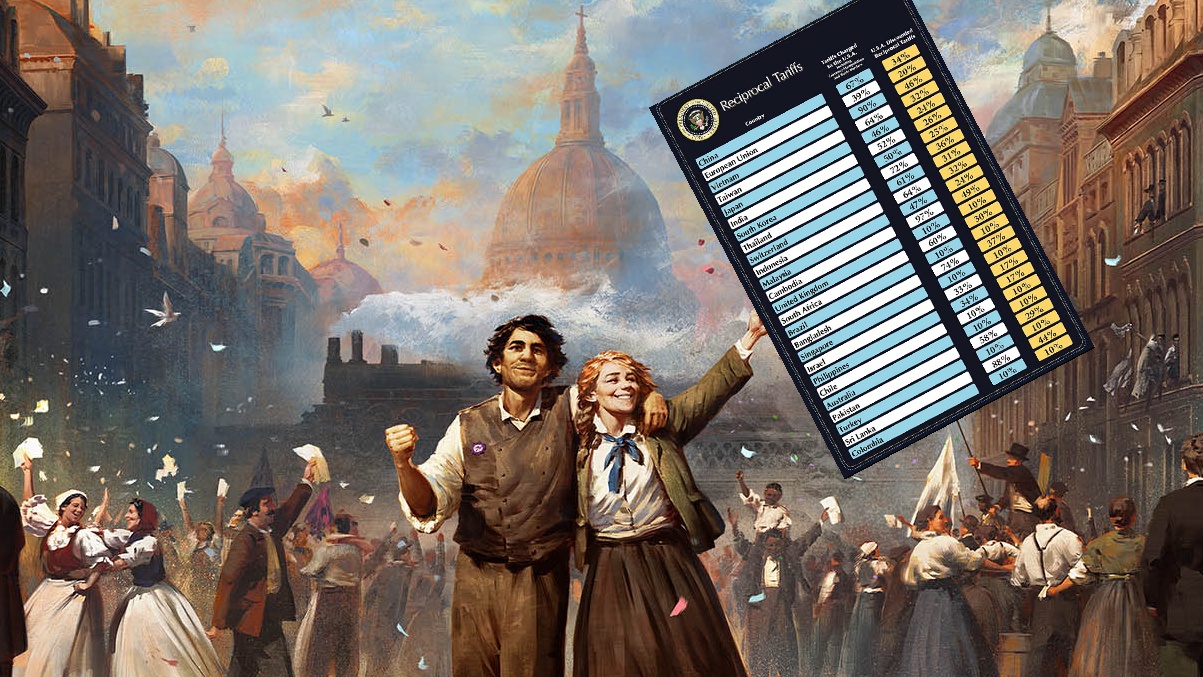
Keep up to date with the most important stories and the best deals, as picked by the PC Gamer team.
You are now subscribed
Your newsletter sign-up was successful
Want to add more newsletters?

Every Friday
GamesRadar+
Your weekly update on everything you could ever want to know about the games you already love, games we know you're going to love in the near future, and tales from the communities that surround them.

Every Thursday
GTA 6 O'clock
Our special GTA 6 newsletter, with breaking news, insider info, and rumor analysis from the award-winning GTA 6 O'clock experts.

Every Friday
Knowledge
From the creators of Edge: A weekly videogame industry newsletter with analysis from expert writers, guidance from professionals, and insight into what's on the horizon.

Every Thursday
The Setup
Hardware nerds unite, sign up to our free tech newsletter for a weekly digest of the hottest new tech, the latest gadgets on the test bench, and much more.

Every Wednesday
Switch 2 Spotlight
Sign up to our new Switch 2 newsletter, where we bring you the latest talking points on Nintendo's new console each week, bring you up to date on the news, and recommend what games to play.

Every Saturday
The Watchlist
Subscribe for a weekly digest of the movie and TV news that matters, direct to your inbox. From first-look trailers, interviews, reviews and explainers, we've got you covered.

Once a month
SFX
Get sneak previews, exclusive competitions and details of special events each month!
I began to suspect things were unstable when the president beat a man to death in the street. Daniel Webster was an odd choice of leader by the American people: his predecessor, Andrew Jackson, did a lot of hate crimes and died early, his popularity hovering somewhere around the level of 'active rebellion'. Yet when it came time for the election, the USA decided it wanted the man who, if anything, thought slavery was even cooler than the last guy did, to the extent that he was willing to kill someone in public over it.
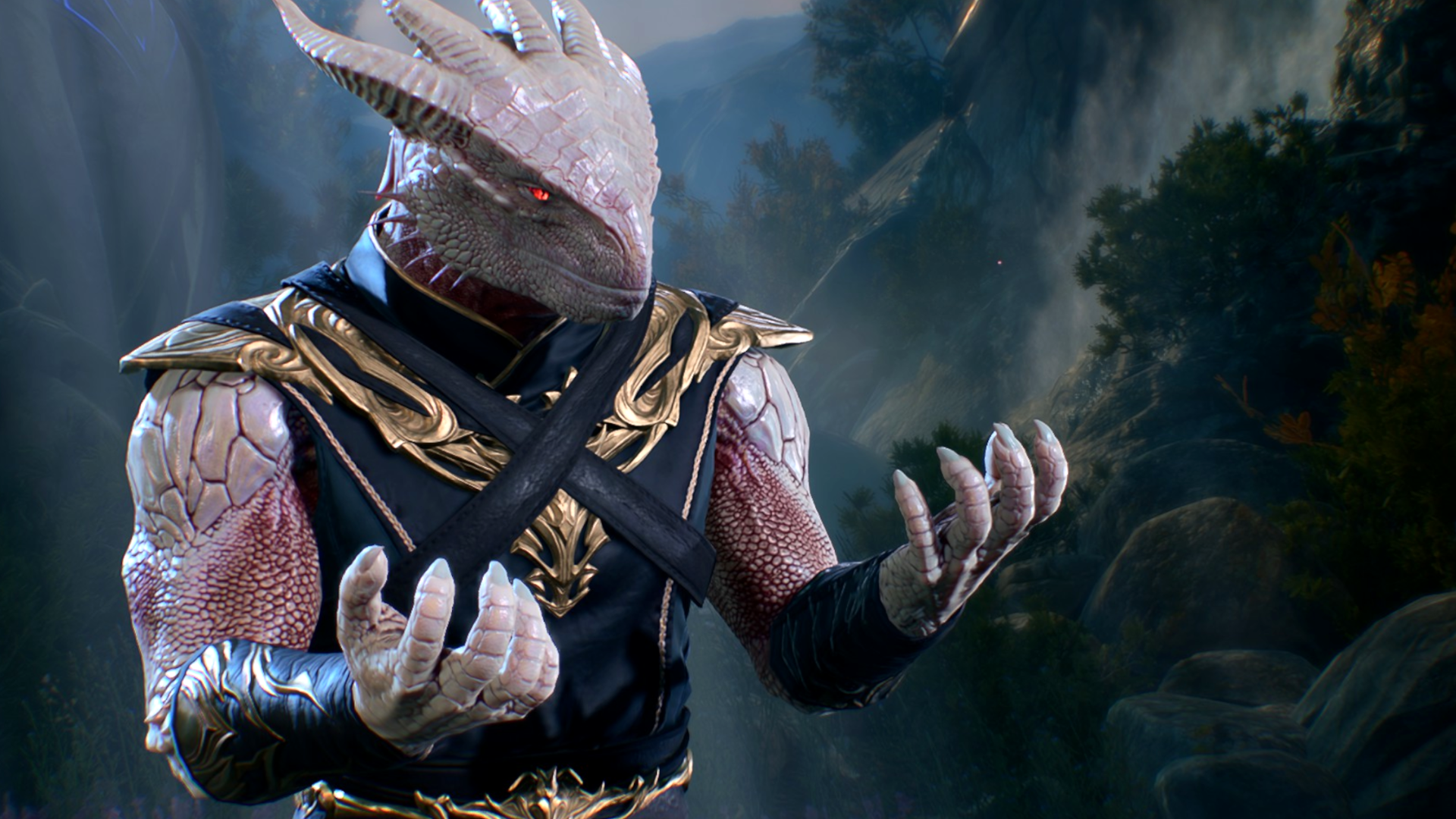
2025 games: Upcoming releases
Best PC games: All-time favorites
Free PC games: Freebie fest
Best FPS games: Finest gunplay
Best RPGs: Grand adventures
Best co-op games: Better together
If you're familiar with my work, you'll know I'm an idiot who knows nothing about anything. Concepts have to be explained to me slowly, at length, and in bright colours, preferably by some kind of animated mascot who also represents a cereal brand. When the global economy was plunged into chaos by the United States' gamut of Liberation Day tariffs on April 2, I was scared and confused. 'What's tariffs?' I asked, but the answers were complex. News outlets used words like "bond yields," "multilateralism," and "rising consumer prices in the Federal Reserve’s rate-setting calculus." I was hosed.
But then it came to me: every valuable lesson I've ever learnt in life was taught to me by a videogame. Why couldn't videogames teach me about tariffs, too? I'd just fire up grand strategy game Victoria 3, adopt an economic policy broadly similar to that espoused by the president on April 2, and see how things went, ending all confusion and bringing peace to the United States forever.
How I invaded Canada
Problem one: Victoria 3 does not actually have a very good way of mirroring the Liberation Day tariffs in its base systems. You set tariffs on goods, not countries, so I couldn't just send the Qing a letter saying 'All your stuff is a trillion bucks now' and call it a day. So I had to hike up the prices of individual imports: +15% on maize here, +20 on iron there.
I installed a mod which set the default 'Encourage exports' protectionism tariff rate from +30% to +100% and figured I'd probably put as much thought into the whole thing as the White House.
Problem two: the numbers you can set don't get quite as galactic as those imposed by Uncle Sam in real life. Victoria 3 restricts you to the bounds of sanity, which just wouldn't do. I installed a mod which set the default 'Encourage exports' protectionism tariff rate from +30% to +100% and figured I'd probably put as much thought into the whole thing as the White House.
Off we went, playing as the United States in the year 1835. I immediately activated what economists call 'hardcore mode': 100% tariffs on imports of everything under the sun. Autarky or bust, baby. We were going to make everything we need right here in this glorious America, from sea to shining sea. I also decided to start researching logistics. Seemed like we'd probably be needing that.
This decision had one positive effect and several deleterious ones. The good news was that my short-term cashflow improved markedly, increasing by about 1.5k thanks to all the people forking over a lot of extra cash for their whirligigs and gewgaws and basic necessities of life. The bad news was there was now a shortage of several key consumer and industrial goods as well as a famine in Colorado.
Keep up to date with the most important stories and the best deals, as picked by the PC Gamer team.
Now, look, I'm from the United Kingdom. I can barely point out Colorado on a map and the only thing I know about it is… well, I guess I don't know anything about it. I didn't really see why I should be concerned that a few people there had to go on a diet or something when the treasury was booming from a sudden influx of cash. But this attitude seemed to negatively affect my government's legitimacy among the ungrateful masses. It was time to begin phase two.
Phase two was building what I needed to meet domestic demand for things like 'food' using at-home facilities. Maybe I should have done this before imposing sweeping tariffs on the entire world, but there was simply no way to know that at the time. Not really understanding what Americans like to eat or where the best farmland was in the country, I figured everyone likes corn on the cob and built maize farms in every territory I had.
Problem three: this accomplished nothing. It turns out you actually have to, like, build farms and plant crops and wait for them to grow before they start nourishing the hungry bellies of your whiny, whiny people. Even worse, the cost of building a maize farm in every backyard in America (and, perhaps, people running out of money with which to buy things) had tanked my formerly booming income right into the red—I was now sitting at -£1K income with nothing to show for it. As if that wasn't enough, suddenly an event popped up where the Democratic Party asked for funding. You literally can't ever escape those emails.
With my budget in the toilet, 48.7% of people in Colorado beneath a minimum expected standard of living, a national income of -£30K, and shortages of paper, wood, iron and explosives, things were looking bad. My Yankee Great Leap Forward was hitting the rocks of a useless citizenry and a load of half-built maize farms. At some point in there we did actually discover logistics, but it didn't seem to help. I guess there was nothing to logist.
There was no way out. My government's legitimacy tumbled to 25—about where Tsar Nicholas II was the nanosecond before someone shot him—with no obvious way to rectify it.
I decided to invade Canada.
How I lost two wars with Canada
It seemed an excellent idea, and generally in keeping with the state of the world at the moment. A war economy to boost the tax base, a 'rally round the flag' effect to bolster my legitimacy, and people couldn't starve if they'd already been shot to death by mounties. It was the perfect plan.
It, uh, it worked. Reader, it's with great concern that I inform you that invading Canada pretty much solved every problem the United States had in one fell swoop. My legitimacy skyrocketed, I was suddenly comfortably in the black financially, and even Colorado stopped complaining about not having enough Biker Jim's Gourmet Hot Dogs or whatever. Yeah, there were still shortages of everything—including, forebodingly, ammunition and explosives—and even more states had now joined Colorado in the 'people living below the poverty line' Olympics but they were only mildly starving rather than severely, now.
Even Colorado stopped complaining about not having enough Biker Jim's Gourmet Hot Dogs or whatever
To be fair, it could just be that enough people had starved to death that there was enough food for the people who were left, rather than it having anything to do with my invasion of Canada, but I'm chalking it up as a win.
Militarily, there were issues. I had mistaken a lot of my Navy's ships for men before I started the war, which led me to erroneously believe that my army was actually a lot bigger than it was in reality. Also an issue: Canada was the dominion of the then-largest empire on Earth—Great Britain, and apparently they get snippy if you march several men and even more boats into Montreal without asking. Limeys, am I right?
So despite some positive early signs—my boys managed to occupy most of southeastern Ontario right at the jump—things did kind of slide backwards once Her Maj showed up in force, beating us back to New York and taking over quite a lot of the eastern seaboard while it did that. Eventually, Old Glory was forced to capitulate and pay reparations, but that was likely for the best: our shortages had gone beyond ammo and paper and now infected luxury clothes, sugar, furniture, and plenty else besides. I still hadn't even wrapped my head around making maize yet, I couldn't start making all that while also fighting the British. Also, at some point during all this the Sioux Nation had declared war on me, which was unsporting.
But things calmed down after that. My budget stayed, inexplicably, very strong and my governmental legitimacy was the highest it had been all game—a cool 83 thanks to its cunning unification of interest groups like small property-holders, industrialists, evangelicals, and the intelligentsia, four universally popular groups that nobody has a problem with. People didn't seem to mind when I increased their taxes to pay for the war, my maize farms got built, and I even unlocked nationalism! Which seemed like just the thing to calm everyone down.
But things, perhaps inevitably, began to slide as this golden era waned. I still had huge swathes of the country living below their expected standard of living, my super-tariffed goods were still expensive and in short supply, and radicals kept popping up to get very angry about it (they were also angry about slavery which, as we've already established, President Webster was two-thumbs-up on, personally).
I had mistaken a lot of my Navy's ships for men before I started the war
My finances were good but the people were unhappy. Then someone went and unlocked 'The labour movement' and, well, it all went to hell. My legitimacy hit 17: we were in full Flight to Varennes territory—the USA was home to 1.32 million radical oppositionists and 150,000 loyalists. The maths weren't looking great for me. Also not helping: my maize-farm-based economy couldn't afford fertiliser, which thanks to my brilliant financial manoeuvrings with our neighbours, cost an amount roughly equivalent to £3,000 a kilo in today's money.
But I was an old hand at this. My truce with Britain had expired, leaving me a free hand with which to once again strike at the enemy's rotten Ontarian heart. Even better, I'd learnt the difference between men and boats, building up my land forces into something vaguely respectable in the time between my previous invasion of Canada and this one.
I declared war—interrupted briefly by a man named 'Bildad Winslow' asking me for money for the Democratic Party again—and let loose the dogs. I also discovered 'organised sports' around this time, which must have been nice for the troops.
But I was betrayed. The Sioux Nation had been defeated shortly after Britain had fought me to an unjust peace, but there were still plenty of other neighbours sharpening their daggers for Uncle Sam's back. This time, the Pawnee launched an assault. My newly expanded army had actually been doing quite well holding their own against the Brits, but were now torn between two fronts. The economic shot in the arm that the last war had been didn't repeat itself, either—I was losing around £20k a day on my doomed attempt to lead America into a corn-based dawn.
My armies death-marched between the Pawnee and Canadian fronts, each time losing men to attrition, to desertion, to the slings and bullets of their foes. The number of radical oppositionists in America increased to 2.65 million. Daniel Webster's presidency looked doomed. Across Washington, hangers-on looked for escape routes to save their wealth, their careers, their lives.
Then the game crashed.
All in all, a mixed bag
I did not relaunch Victoria 3. I figured the game had probably crashed because I was governing too good, and besides I'd already filled my head with powerful new knowledge about tariffs and how the world economy works.
I now understood America's plan to maintain global hegemony. What appeared to be a slightly manic declaration of ill-thought-out trade wars on pretty much the entire planet was in fact an act of tactical genius, destined only to increase state legitimacy and empower the corn lobby. But if any Washington politicos are reading this, take my advice: when things start to head south, just lose a war with Canada.

One of Josh's first memories is of playing Quake 2 on the family computer when he was much too young to be doing that, and he's been irreparably game-brained ever since. His writing has been featured in Vice, Fanbyte, and the Financial Times. He'll play pretty much anything, and has written far too much on everything from visual novels to Assassin's Creed. His most profound loves are for CRPGs, immersive sims, and any game whose ambition outstrips its budget. He thinks you're all far too mean about Deus Ex: Invisible War.
